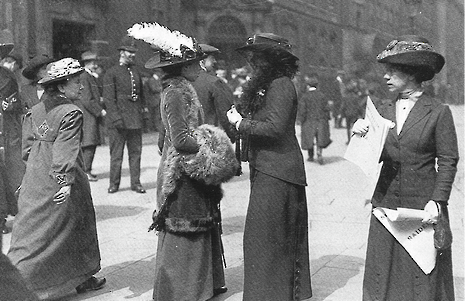Preview: Her Naked Skin
This seminal play is set to explore how two female characters deal with the oppressiveness of pre-war English society

This new production of Lenkiewicz’s tale of forbidden lesbian romance in post-Edwardian England holds a lot of promise. Set in 1913, at the height of women’s rights activism, it powerfully recaptures the fire and excitement, as well as the darkness and danger, at the core of the suffragette campaign. The intensity of it all is heightened in the context of the relationship between Celia and Eve – two women whose political crusading and affection for one another threaten to alienate them from society against their will. The suffragette movement, which fought – sometimes violently – for women’s electoral rights, is the classic example of rebellion in a period which prized social norms of ‘respectability’ above all else, but its intertwining with homosexual romance makes for even more interesting subject matter. Lenkiewicz is the first female playwright to have her play performed on the Royal National Theatre’s Olivier Stage and the play really presents a potent and volatile combination of transgressed boundaries and broken taboos, brought out with flare by director Rose Reade.
The patriarchal theme is a dominant one, but not one treated lazily: “I don’t want to be accused of man-hating”, Reade stresses. At the most fundamental level, Lenkiewicz’s work defines itself in opposition to men and their influence – sexually, politically, socially – so inevitably there is an extent to which they are collectively demonised, but Reade is keen to rise above binary oversimplification. “There are nuances of men”, she reminds me. The set design conveys the oppressive male-dominated nature of society – the stage is covered in newspapers, emphasising the masculine prescription of accepted social-political discourse, and giant iron railings stand in the background to highlight the captivity inherent to the female circumstance.
In seeing Her Naked Skin, we are revisiting a time in which women were marginalised to the extreme, and Reade reminds us of the intensity of the fire that burnt for the suffragette cause. The extent of female struggle and sacrifice is inspiring by today’s standards - and incredible by those of the early twentieth century. At first glance one might think the play timely, given its context of the looming First World War, the centenary of which is this year. Its timing is indeed apt, but not for the reasons people may assume. 1913 is usually overshadowed by the awareness of oncoming war in our historical perspective, but Reade draws our attention away from this, not out of disrespect for male sacrifice, but out of a desire to illuminate a real struggle which has been obscured by our preoccupation with a larger conflict.
Lesbianism is of course central to the play, but Reade does comment: “I feel that there is an element of avoiding the topic”. She wants her production to have the feel of a traditional love-story which, meets a tragic end because of the approaching war. Bea Svistunenko (playing Celia) and Claudia Grigg-Edo (playing Eve) are compelling as the two female lovers. One particular scene in the innocent setting of a tea-shop artfully conveys the captivity and constraint that bears down on their relationship, the rigidity of social norms suffocating the freedom of their affections. Oppression of female liberty is equally manifest at the other extreme. A scene involving a vicious male attack on a suffragette gathering with cries of “You bitch! You anarchist, socialist bitch!” is truly horrifying, and highlights the aggression present just below the surface of outward decorum.
Reade’s production is exciting. The society it presents is one with which – thanks to the endless Edwardian period dramas of which Downton Abbey is perhaps the worst offender – we now feel familiar, and perhaps even comfortable. It was, in fact, a time marked by bitter oppression, prejudice and severe limitation of liberties, and Reade reminds us of this. In reference to mood, I am told also of some comic, lighter elements, their primary role being to make the darker scenes more intense by contrast. Reade suggests that the scenes in Parliament will have a satirical element. Historical characters will be exaggerated for comedic effect, but also to heighten the absurdity of the patriarchal society in which the action takes place.
My only concern is how the class element will be treated. The two lovers, Eve and Celia, come from opposite social groups, and there is a danger that this now rather well-trodden story of the struggle of class divide and of social incompatibility will be overbearing. It is a story that has already been told, and many times over at that. Let’s hope that Reade will not allow it to obscure the far more interesting elements of Lenkiewicz’s seminal work.
 News / Colleges charge different rents for the same Castle Street accommodation2 March 2026
News / Colleges charge different rents for the same Castle Street accommodation2 March 2026 News / News in Brief: waterworks, wine woes, and workplace wins 1 March 2026
News / News in Brief: waterworks, wine woes, and workplace wins 1 March 2026 News / Climate activists protest for ‘ethical careers policy’1 March 2026
News / Climate activists protest for ‘ethical careers policy’1 March 2026 News / Angela Merkel among Cambridge honorary degree nominees27 February 2026
News / Angela Merkel among Cambridge honorary degree nominees27 February 2026 News / Private school teacher who lied about Cambridge degree barred from teaching27 February 2026
News / Private school teacher who lied about Cambridge degree barred from teaching27 February 2026








